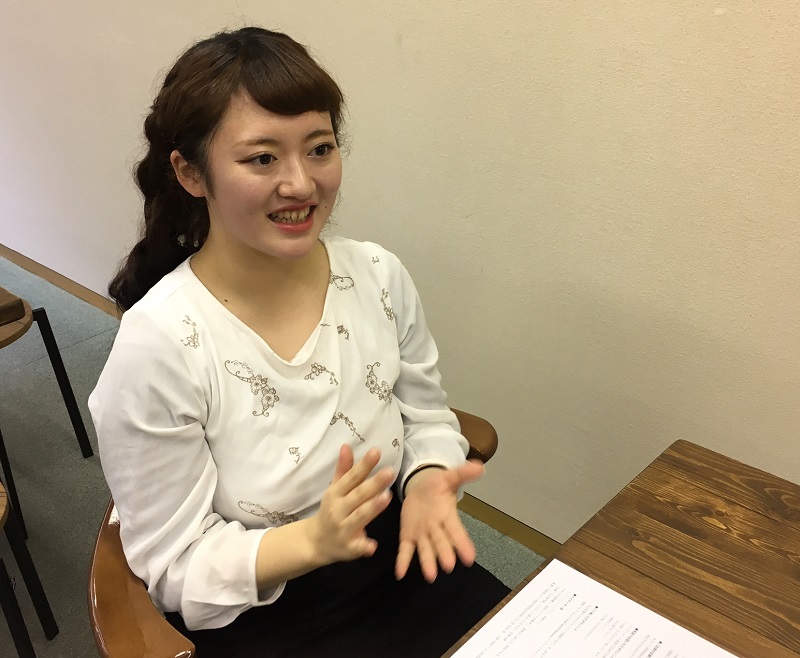Contents
こんにちは、イングリッシュ・ドクターの西澤 ロイです。
様々なレベルの英語学習者の方をゲストにお呼びして、
英語でしゃべっていただく「英語でSpeak Up!」。
今月のゲストは・・・
今回のゲストはバイリンガル落語をやっている
現役女子大生、ぷりん亭芽りんさんです。
今回は落語から学び、より良いパフォーマンス
をするために日々実践していることについて
お話していただきました。
↓↓↓
英語でSpeak Up! #75:英語落語から学び日々実践していること(ぷりん亭芽りんさん)
英語の書き起こし&日本語訳
英語落語から学んだこととは
――What do you think you have learned from RAKUGO?
(落語から何を学んだと思いますか?)
Merin: Well, I have learned many things from RAKUGO.
(そうですね、落語からたくさんのことを学びました)
But, one thing I can say is I think I learned like… kind of like habit to express correctly and think how other people look… how… how I move or express.
(でも、ひとつ言えることは、正しく表現する習慣を身に付け、また、自分の動きや表現が他の人からどう見えているか考えるようになりました)
When I started RAKUGO, ah… I watch… I sometimes watch my RAKUGO performance video.
(落語を始めたとき、私はたまに自分の落語を動画で見るのですが)
And if I look that, the movement of my RAKUGO is… was completely different from what I thinking.
(見てみると、自分の落語は自分が思っていたものと全然違ったのです)
So… and that means, that things that I want to express and tell to the audience couldn’t express one hundred percent correctly.
(それは、自分が表現したい、観客に伝えたいと思っていたことを100パーセント正しく伝えられなかったということです)
So, I tried to think from different sides.
(だから、違う側面から考えてみるようにしました)
客観的に自分のパフォーマンスをチェック!
Merin: So, when I practice RAKUGO, I always put a mirror in front of me.
(落語を練習するときは、前に鏡を置きます)
Yeah… if I do that, I can check my movement or like what am I doing at the RAKUGO like what kind of movement I’m doing at the RAKUGO.
(そうすると、自分が落語でどのような動きをしているかチェックすることができます)
So, if you, listeners, if you are like practicing like kind of like speech or presentation, I think it’s really good way to record yourself, your performance.
(もしリスナーの皆さんが何かスピーチやプレゼンテーションの練習をするときは、自分の声やパフォーマンスを録音することがすごく良いと思います)
So you can check it, oh like, this is too much, oh I have to… oh I have to express this phrase more.
(そうすれば、これはやりすぎだなとか、このフレーズをもっと強調した方がいいな、とかチェックすることができます)
So, yeah, recording of myself, of my performance, and check it with myself is great way to practice in everything.
(ですから、録音して、自分で確認することはあらゆることを練習するうえで素晴らしい方法だと思います)
Like, you know, speaking English or performing something.
(例えば、英会話とか何かのパフォーマンスとかに)
――But, many people, you know, shy away from that.
(でも、多くの人はそれを避けますね)
Merin: Yeah…
(そうですね)
――You know, like listening to what you’re speaking in English, or even videotaping yourself…
(例えば、自分が英語で話すのを聞くことや動画で撮ることとかを)
Merin: Yes, yes, yes.
(そう、わかります)
Yeah, I… yeah, I’m shy, too, so…
(私もシャイなので…)
――You are?
(え?そうなんですか?)
Merin: Yes, I’m really shy person and I always get nervous, so…
(はい、すごくシャイで、常に緊張します)
多くの人にとって必要なプロセスとは
Mering: Ah… to honestly, I don’t wanna see my performance, but umm, I think I have to beat that emotion, that kind of like negative emotion.
(正直に言うと自分のパフォーマンスは見たくないのですが、そういうマイナスの気持ちに勝たなくてはならないと思います)
So, I have to challenge every time, so… I…
(ですから、毎回チャレンジしなくてはなりません)
I try to concentrate, and a deep breath, and look at my video and became like “ah…”
(集中するようにして、深呼吸をして、自分の動画を見る…ため息をつく)
Then, I fix it up again, again, again… yeah, I think many people need that process.
(そして、悪いと思うところを改善する…その繰り返しです、多くの人にとってそのプロセスは必要だと思います)
It’s really hard to do it, I think many people need it.
(そうすることは難しいですが、多くの人にとって必要なことです)
